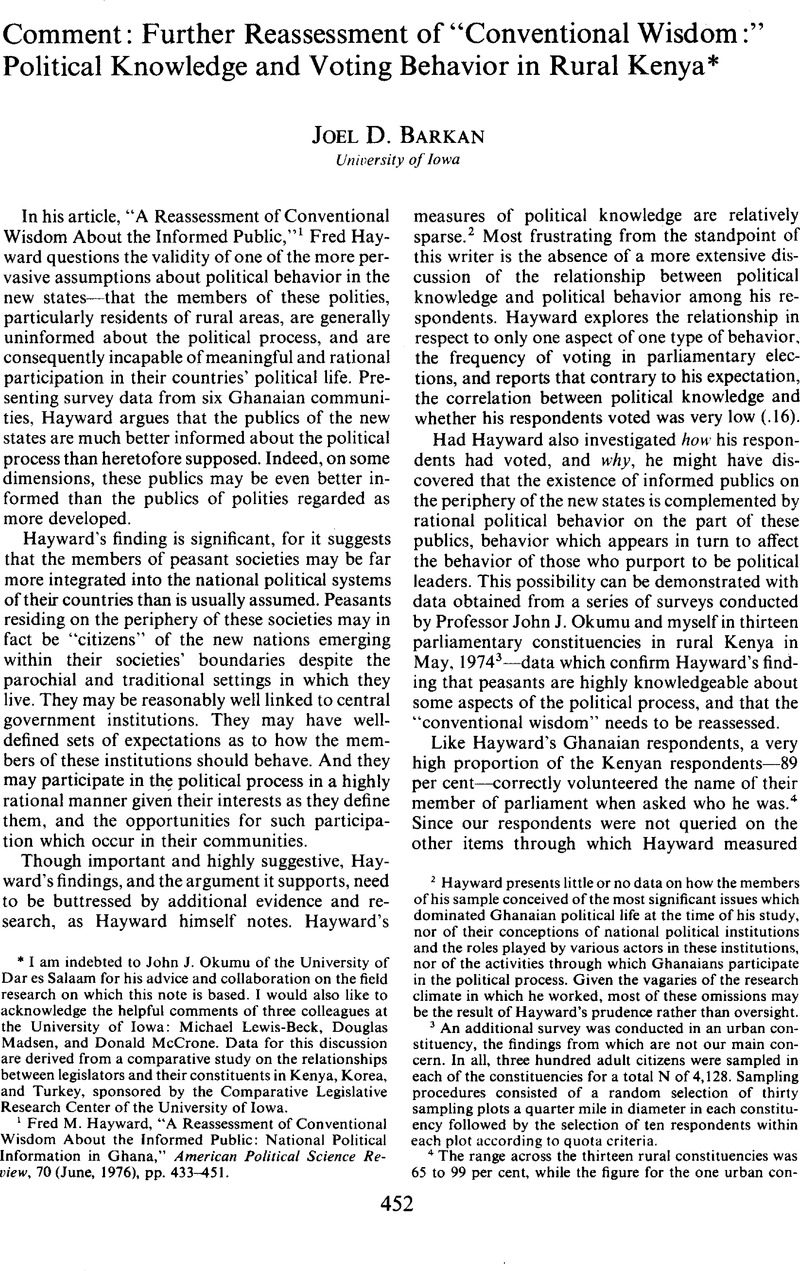Published online by Cambridge University Press: 01 August 2014

1 Hayward, Fred M., “A Reassessment of Conventional Wisdom About the Informed Public: National Political Information in Ghana,” American Political Science Review, 70 (June, 1976), pp. 433–451CrossRefGoogle Scholar.
2 Hayward presents little or no data on how the members of his sample conceived of the most significant issues which dominated Ghanaian political life at the time of his study, nor of their conceptions of national political institutions and the roles played by various actors in these institutions, nor of the activities through which Ghanaians participate in the political process. Given the vagaries of the research climate in which he worked, most of these omissions may be the result of Hayward's prudence rather than oversight.
3 An additional survey was conducted in an urban constituency, the findings from which are not our main concern. In all, three hundred adult citizens were sampled in each of the constituencies for a total N of 4,128. Sampling procedures consisted of a random selection of thirty sampling plots a quarter mile in diameter in each constituency followed by the selection of ten respondents within each plot according to quota criteria.
4 The range across the thirteen rural constituencies was 65 to 99 per cent, while the figure for the one urban constituency was 56 per cent. Given similar results from our Korean and Turkish surveys, we expect that Hayward would have also reported a higher level of political information on the part of his rural respondents, had he presented separate findings for his urban and rural communities.
5 Similar results were found in all thirteen constituencies. Moreover, the MPs for these districts also reported that these were the activities on which they spent most of their time. For more on the congruence of the role expectations held by Kenyan constituents and their elected representatives, see Barkan, Joel D. and Okumu, John J., “Political Linkage in Kenya,” in Political Parties and Linkage, ed. Lawson, Kay (forthcoming, 1976)Google Scholar.
6 Space does not permit a more extensive presentation of data which demonstrate the delegate roles Kenyan constituents expect their MP to play. Suffice to say Table 1 is but one indication of this expectation.
7 A detailed discussion on how our respondents arrived at their evaluation of their MPs given their role expectations is beyond the scope of this essay. In brief, high evaluation scores were accorded to those MPs who were most successful at organizing self-help development projects in their constituencies (e.g., schools, health clinics, roads), and/or those who obtained central government assistance for these projects.
8 For a recent discussion of effect coefficients see Lewis-Beck, Michael and Mohr, Lawrence B., “Evaluating Effects of Independent Variables,” Political Methodology (Winter, 1976)Google Scholar.
9 To cite but two notable examples of this perspective which have set the course followed by others: Huntington, Samuel P., Political Order in Changing Societies (New Haven: Yale University Press, 1968)Google Scholar, and Binder, Leonard et al. , Crises and Sequences in Political Development (Princeton: Princeton University Press, 1971)Google Scholar.
10 The literature on patron-client relationships in the new states is a start in this direction, though virtually none of this literature presents any data on the nature of the individual attitudes and behavior of those who are a party to such relationships. See Powell, John Duncan, “Peasant Society and Clientelist Politics,” American Political Science Review, 64 (June, 1970), 411–25CrossRefGoogle Scholar; Lemarchand, René and Legg, Keith, “Political Clientelism and Ethnicity in Tropical Africa: Competing Solidarities in Nation-Building,” American Political Science Review, 66 (March, 1972) 68–90CrossRefGoogle Scholar; and Scott, James C., “Patron-Client Politics and Political Change,” American Political Science Review, 66 (March, 1972), 91–113CrossRefGoogle Scholar.
Comments
No Comments have been published for this article.